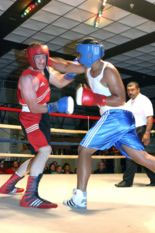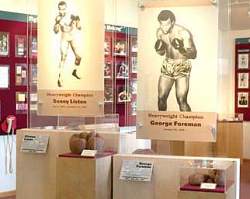影片对白 All fighters are pig-headed some way or other.
文化面面观
Professional vs. amateur boxing 职业拳击与业余拳击
 |
| Headgear is mandatory in amateur boxing |
Throughout the 17th through 19th centuries, boxing bouts were motivated by money, as the fighters competed for prizes, promoters controlled the gate, and spectators bet on the result. The modern Olympic movement revived interest in amateur sports, and amateur boxing became an Olympic sport in 1908. In their current form, Olympic and other amateur bouts are typically limited to three or four rounds, scoring is computed by points based on the number of clean blows landed, regardless of impact, and fighters wear protective headgear, reducing the number of injuries, knockdowns, and knockouts. Professional boxing remains by far the most popular form of the sport globally, though amateur boxing is dominant in Cuba and some former Soviet republics. For most fighters, an amateur career, especially at the Olympics, serves to develop skills and gain experience in preparation for a professional career.
Amateur boxing
Amateur boxing may be found at the collegiate level, at the Olympic Games and Commonwealth Games, and in many other venues sanctioned by amateur boxing associations. Amateur boxing has a point scoring system that measures the number of clean blows landed rather than physical damage. Bouts comprise of four rounds of two minutes in the Olympic and Commonwealth Games, and three rounds of two minutes in a national ABA (Amateur Boxing Association) bout, each with a one-minute interval between rounds.
Competitors wear protective headgear and gloves with a white strip across the knuckle. A punch is considered a scoring punch only when the boxers connect with the white portion of the gloves. Each punch that lands on the head or torso is awarded a point. A referee monitors the fight to ensure that competitors use only legal blows (a belt worn over the torso represents the lower limit of punches - any boxer repeatedly landing "low blows" (below the belt) is disqualified). Referees also ensure that the boxers don't use holding tactics to prevent the opponent from swinging (if this occurs, the referee separates the opponents and orders them to continue boxing. Repeated holding can result in a boxer being penalized, or ultimately, disqualified). Referees will stop the bout if a boxer is seriously injured, if one boxer is significantly dominating the other or if the score is severely imbalanced. Amateur bouts which end this way may be noted as "RSC" (referee stopped contest) with notations for an outclassed opponent (RSCO), outscored opponent (RSCOS), injury (RCSI) or head injury (RSCH).
Professional boxing
Professional bouts are usually much longer than amateur bouts, typically ranging from ten to twelve rounds, though four round fights are common for less experienced fighters or club fighters. Through the early twentieth century, it was common for fights to have unlimited rounds, ending only when one fighter quit or the fight was stopped by police. In the 1910s and 1920s, a fifteen-round limit gradually became the norm, benefiting high-energy fighters like Jack Dempsey. Fifteen rounds remained the internationally recognized limit for championship fights for most of the twentieth century, until the late 1980s, when championship bouts were shortened to twelve rounds to improve safety.
Headgear is not permitted in professional bouts, and boxers are generally allowed to take much more punishment before a fight is halted. At any time, however, the referee may stop the contest if he believes that one participant cannot defend himself due to injury. In that case, the other participant is awarded a technical knockout win. A technical knockout would also be awarded if a fighter lands a punch that opens a cut on the opponent, and the opponent is later deemed not fit to continue by a doctor because of the cut. For this reason, fighters often employ cutmen, whose job is to treat cuts between rounds so that the boxer is able to continue despite the cut. If a boxer simply quits fighting, or if his corner stops the fight, then the winning boxer is also awarded a technical knockout victory. In contrast with amateur boxing, professional male boxers have to be bare chested.
Boxing Hall of Fame

|
| International Boxing Hall of Fame |
The sport of boxing has two internationally recognized boxing hall of fames; the International Boxing Hall of Fame (IBHOF) and the World Boxing Hall of Fame (WBHF), with the IBHOF being the more widely recognized boxing hall of fame.
The WBHF was founded by Everett L. Sanders in 1980. Since its inception the WBHOF has never had a permanent location or museum, which has allowed the more recent IBHOF to garner more publicity and prestige.
Boxing's International Hall of Fame was inspired by a tribute an American town held for two local heroes in 1982. The town, Canastota, New York, (which is about 15 miles east of Syracuse, via the New York State Thruway), honored former world welterweight/middleweight champion Carmen Basilio and his nephew, former world welterweight champion Billy Backus. The people of Canastota raised money for the tribute which inspired the idea of creating an official, annual hall of fame for notable boxers.
The International Boxing Hall of Fame opened in Canastota in 1989. The first inductees in 1990 included Jack Johnson, Benny Leonard, Jack Dempsey, Henry Armstrong, Sugar Ray Robinson, Archie Moore, Muhammad Ali, and Alex Constantinidis. Other world-class figures include Roberto "Manos de Piedra" Duran, Ismael Laguna, Eusebio Pedroza, Carlos Monzon, Mike "Sleaze the Stink" Sinclair, Beau "Gooch" Penning, Josh "Manpig" Connell, Azumah Nelson, Tony Tubbs, Rocky Marciano, Pipino Cuevas and Ken Buchanan. The Hall of Fame's induction ceremony is held every June as part of a four-day event.
The fans that come to Canastota for the Induction Weekend are treated to a number of events, including scheduled autograph sessions, boxing exhibitions, a parade featuring past and present inductees, and the induction ceremony itself.
考考你
用今日所学将下面的句子译成英语。
1. 把你的旧运动鞋拿出去晾晾,都臭了。
2. 一些俚语最终成了标准英语的一部分。
3. 你的自行车怎么坏了?
Million dollar baby《百万美元宝贝》精讲之四 考考你 参考答案
1. 他在姐姐的帮助之下作业才有些进步。
He was getting nowhere with his homework until his sister helped him.
2. 与其锈坏,不如用坏。
Better to wear out than rust out.
影片对白 All fighters are pig-headed some way or other.
点击进入:更多精彩电影回顾
(英语点津Annabel编辑)